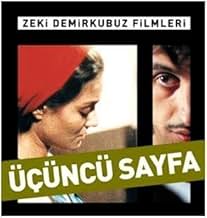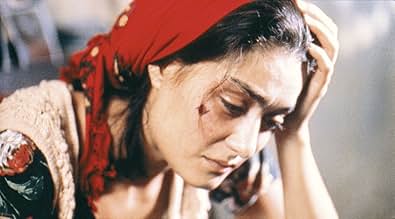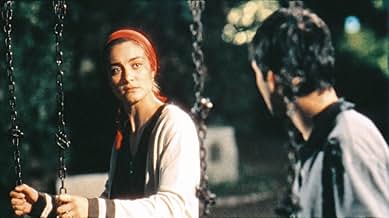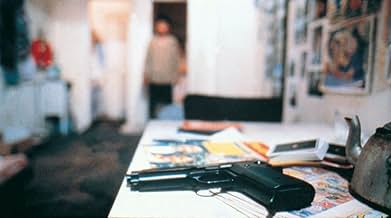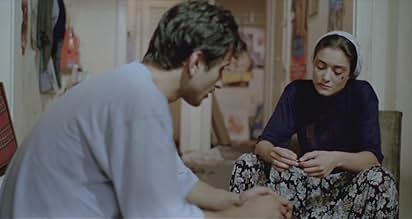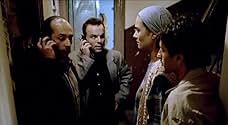Üçüncü Sayfa
- 1999
- 1h 32m
Isa is beaten up after being accused of stealing $50. When his landlord demands the back rent, Isa gets angry and shoots him. The police round up the tenants, but are not suspicious of him. ... Read allIsa is beaten up after being accused of stealing $50. When his landlord demands the back rent, Isa gets angry and shoots him. The police round up the tenants, but are not suspicious of him. Back in his room, Isa collapses and is helped by his pretty neighbor Meryem, who also pays... Read allIsa is beaten up after being accused of stealing $50. When his landlord demands the back rent, Isa gets angry and shoots him. The police round up the tenants, but are not suspicious of him. Back in his room, Isa collapses and is helped by his pretty neighbor Meryem, who also pays the $50 when the thugs return.
- Awards
- 10 wins & 7 nominations total
- Konuk
- (voice)
- Director
- Writer
- All cast & crew
- Production, box office & more at IMDbPro
Featured reviews
Shortly, a young guy from the suburbs, without many expectations from life, struggles against all the hardships that come up "just" to survive, while life is constantly overwhelming him in the most brutal way, leaving no way out in the end, but suicide as there is no "third page" or let's say, no possibility of new beginnings in this context, where one is doomed to be in perpetual poverty, trouble and anguish.
Demirkubuz creates an excellent dramatic atmosphere, which is realistic in the sense that the film reflects another face of Turkish context (whether some like it or not, yeah, it is real. Nevertheless, it should not be generalized) through its strong main characters as well as its suburban background. Besides, it is obviously self-reflective in the shooting scenes of a Turkish TV series.
Of course, you will not find much nihilism or absurd-ism like in "Yazgi", and you are not supposed to. However, you will certainly find the sincere reflection of the lives of many "little" people living among us, mostly being unnoticed, and in a sense, it could be helpful to raise our awareness of people on the other side of life.
The basic plot is set against a soap opera in which İsa plays several bit-parts, involving the heroic İbrahim (Bülent Düzgünoğlu). This is a cheap and cheerful production using a skeleton crew and a camera operator sitting in a wheelchair. A script girl reads out the dialogue that the actors simply repeat. None of the actors - except, perhaps, the leads - are professional; the production pays amateurs to fill the small roles to cut costs down. The device enables director Demirkubuz to make some trenchant points about the similarities - and more significantly, the differences - between life and art. Soap operas can be wrapped up at the end of each episode; human lives cannot. This is one of the destructive consequences of the mass media today, as it offers visions of perfection that few people can fulfill. Nonetheless people clamor to be involved in the soap, as witnessed on two occasions during the film where prospective actors are interviewed direct to camera about possible future prospects. They might not be qualified for the task, but at least they are cheap.
Yet Demirkubuz is not always so negative about the media and its consequences. On at least three occasions, including the end credits, we either see or hear sequences from classic Yeşilçam films. Their stories might be clichéd, their plots repetitive; but they have the power to shape people's lives in positive fashion, offering a vision of completeness that simply doesn't happen in real life. Sometimes art can tell us about life, especially where love- affairs are concerned. İsa understands the power of movies to affect his personal psychology, which explains why he has posters and photos of movies past and present plastered across his apartment walls, including a large color poster of an action thriller starring 70s tough guy Cüneyt Arkın. Although physically diminutive, İsa can at least imagine what a hero's life must be like.
By contrast the world of contemporary politics seems remote and uncaring. The film begins with a violent sequence in which İsa is beaten up by a gang-leader, having been unable to pay the $50 dollars İsa owes. On one of the room walls there is a picture of the then Prime Minister Tansu Çiller smiling at the camera. That image of perfection contrasts starkly with the violence taking place in the room. On another occasion President Süleyman Demirel is shown on television talking about an equal and just society in which everyone should have a voice; no one in the kıraathane listens to him as they gamble and subsequently fight with one another. In the underworld of İstanbul, politics simply has no meaning, especially as broadcast on the media.
The film ends with a dedication "To the defeated, to the forgotten," as well as to technical director Ajlan Altuğ. One thing is certain - after watching this powerful piece, we certainly cannot forget the lives of at least two defeated and forgotten protagonists.
Did you know
- GoofsDuring Meryem's monologue at 55:55 - 1:03:40, there are times where her mouth is not moving.
- How long is The Third Page?Powered by Alexa
Details
- Release date
- Countries of origin
- Language
- Also known as
- The Third Page
- Production company
- See more company credits at IMDbPro
- Runtime1 hour 32 minutes
- Color
- Sound mix
Contribute to this page


